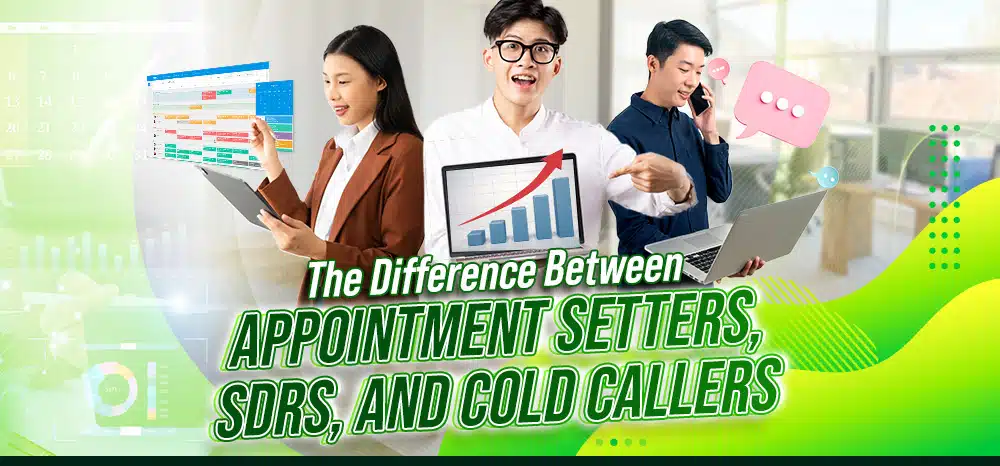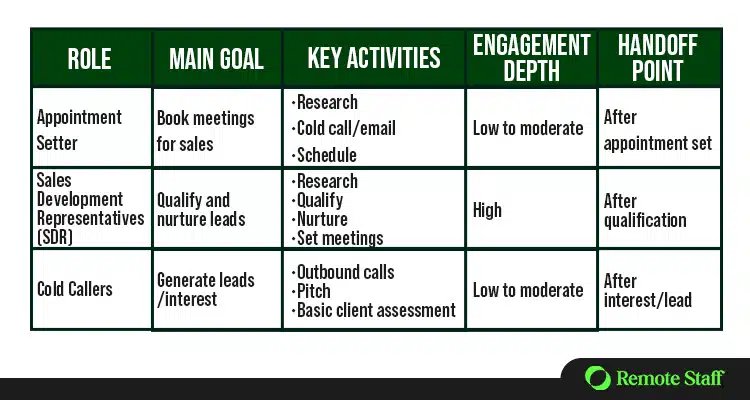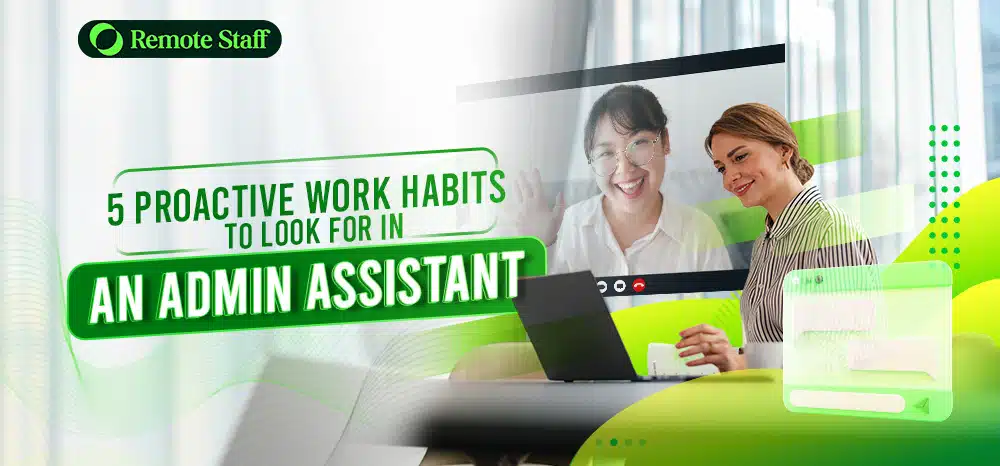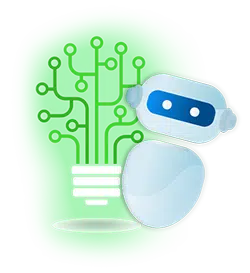Looking to improve your company’s Business to Business (B2B) lead generation and generate more sales?
If so, having the right team in place to generate, qualify, and convert leads is crucial to your success.
Here’s where specialized outbound sales roles like Appointment Setters, Sales Development Representatives (SDRs), and Cold Callers enter the picture.
Understanding the difference between these roles helps you find the best candidates for your business’s needs.
So, here’s a detailed breakdown of each role and how each one can improve your sales lead generation.
Appointment Setters
Let’s begin by discussing the role of appointment setters in business.
Appointment setters are typically entry-level sales professionals responsible for scheduling meetings between prospective clients and your company’s sales representatives.
They work with predefined lead lists or marketing-qualified inbound inquiries to maximize the number of qualified meetings for the sales team.
Furthermore, while they handle the initial outreach and basic eligibility tests (i.e., confirming industry fit and availability), they do not perform in-depth needs analysis or budget assessment.
Some companies merge the roles of an appointment setter and virtual assistant (VA), resulting in virtual appointment setters.
These specialists handle lead research, CRM (Customer Relationship Management) updates, cold calling, calendar management, and follow-ups.
Duties and Responsibilities
An appointment setter’s responsibilities include:
- Outbound Outreach:
- Executing high-volume calling to contact potential clients and introduce the company’s offerings.
- Appointment Scheduling:
- Coordinating calendars to book consultations or demos between qualified prospects and account executives.
- Basic Qualification:
- Verifying simple eligibility criteria (i.e., geographic location, company size, and decision-maker availability) before booking.
- CRM Management:
- Logging all interactions, outcomes, and follow-up actions in CRM systems to ensure data accuracy and pipeline visibility.
- Follow-Up and Reminders:
- Sending confirmation emails and reminders to reduce “no-show” rates, which improves calendar utilization.
Required Skills and Qualities
When hiring a virtual appointment setter, look for the following skills and qualities:
- Excellent Communication Skills:
- Capable of speaking and writing clearly, confidently, and professionally.
- Able to adjust their tone and messaging depending on the prospective client’s industry or their response.
- Tech Savviness and Tool Mastery:
- Able to operate multiple applications (i.e., CRMs, auto-dialers, scheduling tools, and collaboration apps) with ease to ensure seamless outreach and booking.
- Self-Discipline and Time Management:
- Capable of structuring their own schedule to hit call and booking targets, manage follow-ups promptly, and minimise downtime with little to no supervision.
- Attention to Detail:
- Able to accurately log call outcomes, appointment details (including time zones), and CRM updates to support downstream sales activities.
- Persistence and Resilience:
- Capable of remaining motivated despite frequent rejections and refining their objection-handling approaches.
- Adaptability:
- Able to quickly integrate feedback, update scripts, and adjust targeting criteria to pivot strategies effectively in response to performance data or market shifts.
- Emotional Intelligence:
- Capable of reading prospect cues without visual feedback, display empathy, and foster trust during brief interactions, thereby increasing appointment commitment.
Tools and Technologies
Here are some common tools appointment setters use to achieve their tasks:
- CRM Platforms:
- CRM systems centralise data from prospects, track interactions, and automate follow-ups.
- Dialing Software:
- Auto-dialers and virtual phone systems help accelerate call throughput and logging.
- Scheduling and Calendar Tools:
- Automated scheduling links eliminate the need for back-and-forth emails between appointment setters and prospective clients.
- Call Analytics and Conversation Intelligence:
- These insight platforms analyse call recordings and conversation data for coaching and optimisation.
- AI-Powered Sales Enablement:
- Generative AI assistants boost productivity by drafting outreach and surfacing real-time guidance.
- Data Enrichment Platforms:
- These tools enhance lead lists with firmographic and contact details to improve call relevance.
- SMS and Multichannel Automation:
- These enable businesses to send timely and targeted messages across text, email, and other channels without manual effort.
Strategic Value to Businesses
Having a skilled appointment setter in your team enables senior sales staff to focus on closing deals, boosting overall team productivity.
In addition, leveraging appointment setter virtual assistants allows you to rapidly and cost-effectively scale your outreach without having to expand your closing teams.
Finally, having them provide prompt follow-ups and clear communication to prospective clients fosters a positive first impression, setting the tone for successful sales engagements.
Sales Development Representatives (SDRs)
Next, let’s take a look at Sales Development Representatives (SDRs).
This sales qualification role acts as the bridge between marketing-generated interest and the closing expertise of account executives, ensuring the seamless hand-off of Sales-Qualified Leads (SQLs).
Their focus is mostly on top-of-funnel activities like sales prospecting via cold calls, emails, and social touches to identify and engage potential customers who fit your company’s Ideal Customer Profile (ICP).
SDRs also conduct brief discovery conversations, applying frameworks like BANT (Budget, Authority, Need, and Timeline), to qualify SQLs before handing them off to account executives.
Duties and Responsibilities
Sales Development Representatives are primarily responsible for:
- Prospecting and Lead Identification:
- Researching and building target lists using platforms like LinkedIn and data providers, focusing on prospects that match predefined ICP criteria.
- Multi-Channel Outreach:
- Executing coordinated sequences of cold calls, personalised emails, and social touches, often following a “touch cadence,” to maximise connection rates.
- Lead Qualification:
- Applying frameworks like BANT during discovery calls and emails to assess a prospect’s readiness and fit before advancing them.
- Handoffs and CRM Management:
- Scheduling qualified leads for meetings with account executives and meticulously logging all interactions in CRMs to maintain pipeline visibility.
Required Skills and Qualities
To find top SDRs, look for the following skills and qualities:
- Communication and Rapport-Building:
- Capable of crafting concise, compelling messages and adapting their tone across channels to engage diverse prospects.
- Analytical and Data-Driven Mindset:
- Able to interpret outreach metrics and A/B testing cadences for continuous optimisation of qualification processes.
- Resilience and Persistence:
- High rejection rates demand a resilient mindset and the discipline to follow up persistently without alienating prospects.
- Coachability and Adaptability:
- Capable of rapidly integrating feedback, updating scripts, and pivot targeting based on performance data and market shifts.
Tools and Technologies
Here are some tools your SDR needs to accomplish their work:
- Sales Engagement Platforms:
- These allow SDRs to automate, track, and personalise a multi-channel outreach across email, phone, and LinkedIn.
- Lead Intelligence and Intent Data Tools:
- SDRs use these to find and prioritise high-intent leads based on company activity or buyer behavior.
- CRM Advanced Features:
- While appointment setters also use CRM tools to log calls or tasks, SDRs use deeper features like lead scoring, workflows, and pipeline forecasting.
- Conversation and Intelligence Tools:
- These tools record and analyse SDR sales calls for coaching and performance improvement.
- Sales Enablement and Playbooks:
- These platforms guide SDRs with the right talk tracks, content, and resources for every sales scenario.
Strategic Value to Businesses
A Sales Development Representative ensures higher conversion rates by using structured qualification frameworks to determine a lead’s readiness to take the next step.
This, in turn, boosts sales efficiency as your account executives can more accurately identify and focus on high-quality leads.
Furthermore, as they work at the top of the sales funnel, SDRs help your business scale lead generation more predictably.
In addition, SDRs can help refine your messaging, product offering, and targeting by gathering and processing feedback from qualified leads.
Finally, SDRs bridge the gap between marketing and sales, further improving your marketing’s return on investment (ROI).
Cold Callers
The last role we’ll discuss is cold callers.
Cold callers place outbound calls to individuals or businesses who haven’t yet expressed interest in your offerings, with the primary aim to generate initial awareness and sound out potential leads.
They prioritise quantity over depth, keeping conversations very brief (typically under two minutes) to maximise the number of connections.
Thus, they don’t engage in consultative discovery or detailed needs analysis; instead, they probe for a single interest or pain point that justifies a hand-off.
Their primary output is a basic lead profile or an appointment hand-off to SDRs or account executives for comprehensive qualification.
Duties and Responsibilities
A cold caller’s duties and responsibilities include:
- High-Volume Outreach:
- Executing hundreds of calls daily using auto-dialers or manual dialing setups to maximise contact attempts.
- Scripted Pitches:
- Following structured scripts that open with a brief introduction, a concise value proposition, and a clear call to action prompts.
- Basic Qualification:
- Capturing minimal criteria like the prospect’s name, role, company size, and expressed interest level before logging data.
- Data Entry:
- Accurately recording call outcomes, dispositions (“interested,” “not interested,” “call back later”), and any brief objections in the CRM app.
- Appointment Scheduling:
- Scheduling follow-up meetings on occasion or transferring warm prospects directly to calendar booking tools.
Required Skills and Qualifications
Skilled cold callers possess the following skills:
- Resilience and Persistence:
- The ability to remain comfortable with high rejection rates, as often over 80% of calls end without an affirmative response.
- Clear Verbal Communication:
- Delivering scripts smoothly, with a confident tone that engages prospects quickly.
- Active Listening:
- Possesses keen attention to prospects’ cues to capture any hint of interest or objection within a brief dialogue.
- Time Management:
- Skilled in maintaining call pace, handling wrap-up tasks, and moving swiftly to the next contact.
- Detail-Oriented Data Entry:
- Capable of precision in logging call outcomes, as small errors can lead to missed opportunities or duplicate outreach.
Tools and Technologies
Cold callers use many of the same tools that appointment setters and SDRs use for their daily work. These include:
- Auto-Dialers and Power Dialers:
- Platforms like PhoneBurner or RingCentral automate dialing and call logging, boosting call throughput.
- Call Scripting Software:
- These tools display dynamic scripts and next-step prompts based on call outcomes.
- Basic CRM Systems:
- Used for tracking call dispositions and scheduling follow-ups.
- Calendar Integrations:
- Simple booking links embedded in email follow-ups to capture warm prospect appointments.
Strategic Value to Businesses
Cold callers serve as the frontline of outbound sales, rapidly saturating new or untapped markets with minimal resource investment.
In addition, they feed a constant stream of raw leads into your sales funnel, allowing your SDRs and account executives to focus on higher-value, consultative selling activities, further improving overall sales efficiency.
Finally, since cold calling elicits immediate verbal reactions, cold callers provide real-time market feedback, enabling rapid iteration of scripts and outreach strategies for maximum effectiveness.
Comparing Roles: Appointment Setter vs. SDR vs. Cold Caller
While appointment setters, SDRs, and cold callers contribute to filling the sales funnel, there are several major differences between them.
Here’s a table comparing the functions of each role:
Additional Notes:
- Although appointment setters may use cold calling to generate leads, their main success metric will always be the number of meetings booked, not closed sales.
- Due to their wider scope, which includes inbound and outbound lead qualification, SDRs may overlap with appointment setters in some organizations.
- Cold callers can sometimes be considered a subset of appointment setters; that said, depending on the organization, their focus may be purely on generating leads or making direct sales.
Hiring the Right Sales Expert for Your Business
Choosing the right sales expert can be challenging due to the seeming overlap between appointment setters, SDRs, and cold callers.
Fortunately, by understanding the points above, you’ll have an easier time differentiating the three and selecting the appropriate one for your current needs.
After determining what sales role you need, the next step is to find qualified candidates.
The best way to find top talent is by working with a trusted outsourcing company like Remote Staff.
We’ll connect you with vetted appointment setters, SDRs, and cold callers and provide ongoing support – so you won’t have to navigate this process alone.
Ready to start hiring a sales expert? Request a call back today, and we’ll be happy to assist you.
- Want FREE AI Prompts for Different Areas of Your Business? Check out these 100 AI prompts.
- If you’re ready to experience the full advantages of working with a top global team, check out our 1,000 fully vetted and highly talented staff here.
John Carlo Pagsolingan is a carefree yet hardworking writer with aspirations of becoming a teacher in the future. He believes that remote working isn’t just a substitute; but is a legitimate alternative to face-to-face work. Learn more as he writes about the advantages of remote work and tips for aspiring remote workers.

























